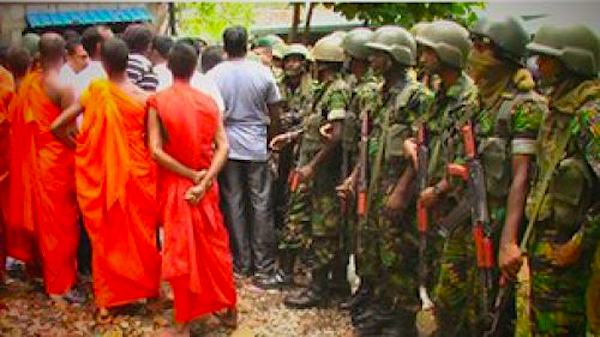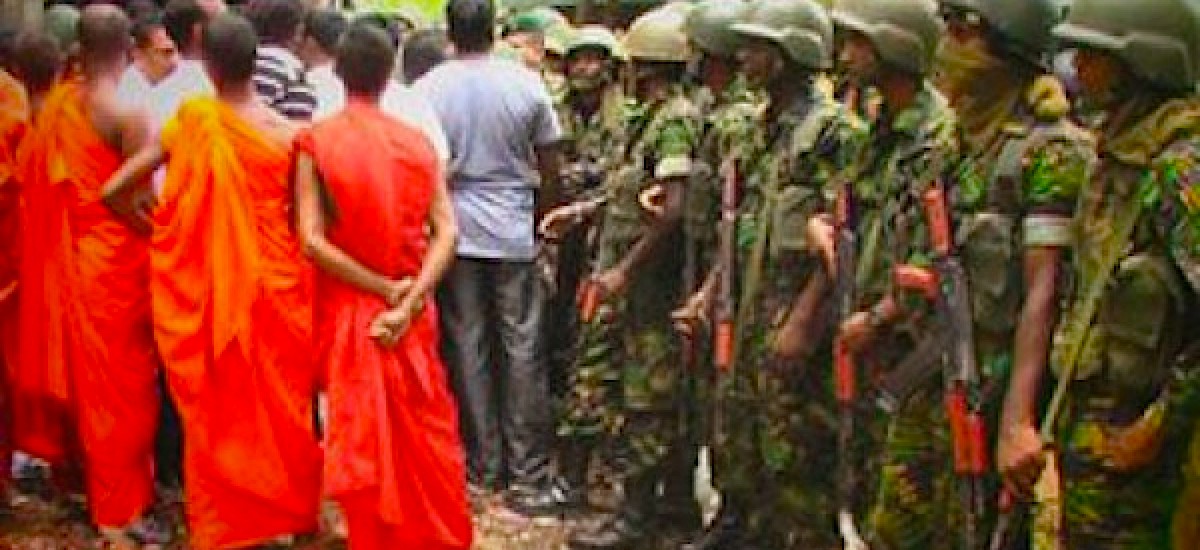
Image courtesy BBC
The storming of the Dambulla Mosque on Friday the 20th April and chasing away of the Muslim worshippers attending Friday prayers by a mob led by Buddhist priests is epoch making in modern Sri Lankan history. The majority of the people of all communities are shocked and incensed by the way Buddhist priests lead this violent and destructive mob against the Dambulla Mosque.
According to authorities this mosque has been in existence since 1964 and built with the support of the people of the area and the Viharadhipathy, the Chief Incumbent of the historic Dambulla Rajamahavihara. Deplorably the pretext used by the mob led by the Monk is that this mosque is built on sacred land. This casts aspersion upon the goodwill of the people and the then Chief Incumbent of the Dambulla Rajamavihara as lesser Buddhists than the latter to permit the Muslim countrymen to worship in the place they domicile/work. This raises several questions about the authenticity of the Buddhist Monks who participated in this about their true Buddhist credentials.
The Buddhist –Muslim relation in Sri Lanka is more than ten centuries old and this bond has hitherto been not broken despite the 500 years of colonial rule, the post colonial period and beyond. The Muslims did not succumb to the divide and rule politics of the colonial powers and they distinctly identified those that are alien from those that are their countrymen. This is the reason why Muslims did not become surrogate of the colonial masters and therefore bore the brunt of suffering with the majority Buddhists during the colonial period. This is because Buddhist –Muslim relationship is not built on opportunities or marriages of convenience but of sincere understanding and goodwill, time tested by centuries of coexistence. This is the reason why Muslims stood as a buffer against the division of the country inspite of the bulk of them being Tamil speaking, therefore they got battered and butchered when they were praying in the mosques by the LTTE and still, more than 100,000 Muslim IDPs are living in squalid conditions and are deprived of their livelihood and domicile in spite of the end of war, which, neither the GOSL nor the International community shows pity on them. The reason why this bond is stronger is because both these communities strongly believe in the unhindered sovereignty of the Sri Lanka state. A cursory glance at the history of Sri Lanka would testify why the colonial invaders found the Buddhists and Sri Lankan Muslims as their enemy and not otherwise.
Dambulla mosque attack is not a yardstick to measure the strength of the Muslim-Buddhist bond and it is not going to be broken just because some believe that few frictions here and there would weaken both communities by polarization. This attack is not against the Muslims, this is an attack against the sovereignty of the state judging by the way these are emerging. Since Buddhists cannot be taken head-on, the strategy is possibly to polarize the Muslims and the Buddhists so that would create justifications to paint the majority Buddhist community as racist to achieve the grand plans of those who are pulling strings.
Prelude to Geneva Resolution
With the end of the war and elimination of the LTTE, India and the western powers lost leverage in Sri Lanka. India lost its geopolitical spindle and so has the West. Ever since both entities were on the lookout for regaining leverage in Sri Lankan affairs and the hype created by the Channel 4 and the lackadaisical response of the GOSL to the suffering of the Tamil community gave them the opening. In the prelude to the Geneva Resolutions too, the Muslims played a distinct role to safeguard the sovereignty of the state from interference and interventions. The Muslims staunchly sided with the GOSL not because they were against their Tamil brethren but because the sovereignty of Sri Lanka is a shared responsibility. The ministers, deputy ministers and their bandwagon went with fanfare and squabbled upon their return. This shrouded the catalytic role played by the Muslims. Sheik Rizvi Mufthi and Sheik A.C.Agar Mohammed, both senior Islamic scholars from the All Ceylon Jamiyyathul Ulema toured Geneva and influenced and invoked Muslim country representatives to vote for Sri Lanka at the resolution. These are unofficial ambassadors who volunteered to save the sovereignty of Sri Lanka from being tarnished.
Those who harbour ill will against our country know that Buddhist-Muslim bond is formidable and would be a deterrent to their schemes and therefore polarizing both these communities would be the first step. Attack against the Muslims should be viewed in this light. The more we are divided external interventions would become stronger.
Nuwara Eliya Mosque opening by the President
President Mahinda Rajapakshe set a precedent in modern Sri Lanka by opening a Mosque in Nuwara Eliya on the 11th April 2012 . This is the first time in Sri Lanka’s modern history that the Head of the Nation a devout Buddhist inaugarated the opening a Mosque for the Muslims. It is also noteworthy in the President’s speech, that he pointedly mentioned that “the Muslims have always been friends of the Sinhalese historically as well as today and that they have been defending the country together with the Sinhalese”. This is a testimony to the Buddhist – Muslim bond which some can feel disturbed about. Definitely this visible emerging bonding relation between two communities is an eyesore to those who harbour ill will against Sri Lanka and they would go to all means to polarize its people.
Extremism
Extremism is not a part of the religion of the Muslims or Buddhists in Sri Lanka or the world over. Widespread extremism in modern societies is a modern phenomenon. Extremism is a by product of seeking change at an accelerated pace with emotional overdrive or is an intelligent manipulation of the gullible. Studies indicate that in post colonial Muslim countries, extremism is identified as the product of the Western or proxy intelligence agencies’ manipulations. This was done to hinder gradual transition from post colonialism to nation building in their own terms and choice. So that nation building would take a rational and evolutionary process and result in formulating a peaceful and stable society. Such a stable and peaceful society would effectively discard colonial vestiges and build nations based on their values and ethos. Extremism is an anathema to progress and hinders stable growth of a society. The post colonial societies are not immune from this scourge and in particular Muslim countries are the most spawned to keep them divided. Extremism does no good to a society. It breeds conflict and violence and acts as a barrier to gradual progress and inhibits sustainable development in society. It makes society unstable and contributes to failed state conditions. Religious extremism of any hue or colour is not a positive contributor; instead it destroys the very religion it represents and polarises societies. Such societies will be unstable and vulnerable to external interventions.
Fortunately in Sri Lanka religious extremism from all religious groups is a rare commodity and violent extremism was non-existent. It was only chauvinism that had notoriety in Sri Lanka. The debilitating three decades separatist war brought sense to our leaders about the need for nation building which we should have embarked upon immediate to the British exit from the shores of Sri Lanka and which we didn’t. With the end of the war and decimation of the LTTE, time was ripe for nation building. This includes physical building of the state as a sustainable and stable system and mending hearts and minds of all people across the country and building a single nation of diverse cultures, beliefs and values. Unfortunately at this stage Sri Lanka as a majority Buddhist country is experiencing emergence of Buddhist extremism. The timing of this emergence raises many questions of why it did not emerge during the war and why not immediately after independence from Britain in 1948? Why should it emerge now and who are behind such an emergence?
What national benefits does the country get by Buddhists destroying mosques? Are they going to increase our GDP or Gross Domestic Happiness? Are we not driving our motherland to another abyss? It is very doubtful that any sane Buddhist would embark on such a suicidal mission at a time the sovereignty of the state is questioned and with a partner community that has an asymmetrical advantage to grant to the Sinhalese. This creates suspicions about genuineness of the group that attacked the Dambulla Mosque. Whether they are for a parochial gain or are mercenaries working for agents of a foreign master should be probed into.
Failed State Phenomenon
Sri Lanka is turning out to be a lawless country and a failed state phenomenon. The Dambulla Mosque and similar incidences where mobs led or instigated by Buddhist monks goes unpunished for violating all the legal norms and public decency and the victims are victimised by the state by not providing legitimate protection a state ought to provide its citizens. This is a distinct failure on the part of the state to protect its citizens and their assets from these marauding mobs. If the state continuously fails to provide security to its citizens and their assets, where can the citizens seek protection from?
The Government is caving into extremism; in this case of Dambulla Mosque which is existing since 1964, the GOSL seems weak and has approved the relocation of the mosque to a new site. Is this the right answer, aren’t they setting precedent which would drive score of mosques to seek new sites and create commotion all over the country? Such a move would certainly play into the hands of those who are fomenting trouble in the country using the mobs as their mercenaries to cause division amongst the people and open the country for external interventions.
Would this be a threat to the GOSL?
In the post 9/11 world, the West is in the process of restructuring the architecture of power and global controls. This revivification and realignments are today achieved through some NGOs and Dissenting Groups (DGs) in societies amongst other tools. Therefore the West and regional powers are strengthening DGs & NGOs and surrogating them. At times they provoke the surrogates to foment conflicts within societies and use such artificially generated conflicts as pretexts to intervene in nation states in the guise of Responsibility to Protect (R2P). There are ample evidences in Egypt, Libya and Syria proving the fact of how DGs were used as de-stabilizing forces in countries followed up by Western intervention of some sort. In this scenario, GOSL impotence to uphold law and order and failure to bring quick and effective control of mob pressure and violence at the incipient stage is very dangerous. Such mob pressure if let loose would possibly snowball into a mammoth mob almost threatening the GOSL and swarm and immobilize them as happened in Egypt and other countries.
In light of this, it is recognised how spurious the claim of those who attacked the Dambulla Mosque. Sri Lanka as a historically Buddhist country, any part at any time can become ‘Sacred Land’ and conflict can emerge anytime anywhere. These spurious claims do not help the living to live as peaceful citizens but disturb the stability of the country eternally. This inhibits nation building and peaceful co-existence.
Taking note of these facts, the GOSL should never allow anyone to take law into their hands. Maintaining law and order and civil administration should be the prime prerogative of the GOSL and the state machinery unless the GOSL wishes to abdicate their authorities to the mobs and stamp Sri Lanka as a failed state.

